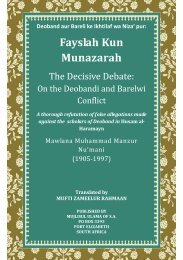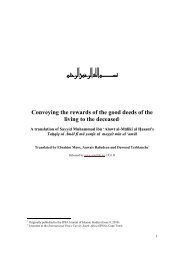al_etidaal_gn
al_etidaal_gn
al_etidaal_gn
Create successful ePaper yourself
Turn your PDF publications into a flip-book with our unique Google optimized e-Paper software.
forces and working out its schemes, every party tries to work for the downf<strong>al</strong>l of<br />
others, to swear them into the earth and to wish them dead.<br />
It is so funny that every party wished the other dead and yet they cry and complain<br />
that the Muslims are heading for destruction.<br />
WARNING<br />
From this that has been written above, you will have to come to know that not every<br />
form of difference of opinion is denounced. Many forms of differences are<br />
praiseworthy. However many types of dissent are certainly deplorable and detestable.<br />
Thus it shows a lack of knowledge about Islamic principles to regard <strong>al</strong>l the<br />
differences of the Ulema as being the cause of disruption and confusion. If there is<br />
any cause for disruption here, it is the use of the laudable differences of the Ulema for<br />
the creation of disputes and quarrels whether these disputes arise among the Ulema or<br />
the common people as we see today.<br />
However, tne re<strong>al</strong>ity ot praiseworthy dissent is based upon knowledge of the rules of<br />
Shariat.<br />
This is <strong>al</strong>so a f<strong>al</strong>lacy that every person may come <strong>al</strong>ong with a difference of opinion,<br />
whenever he likes and it should be considered as laudable. Everything that has been<br />
explicitly proven from the Shariat does not <strong>al</strong>low any deduction and to disagree<br />
therewith is grave error. The Quran warns against this:<br />
“And be not of those who separated and dissented after clear proof had come to<br />
them.” (3. 105)<br />
Saeed bin Musayyib (Radi<strong>al</strong>lahu anhu) once saw a person performing nafi S<strong>al</strong>aah<br />
after Asar prayers. After the prayers the man told Ibn Musayyib (Radi<strong>al</strong>lahu anhu) :<br />
“Do you think Allah will punish me for having performed S<strong>al</strong>aah?”<br />
Ibn Musayyib (Radi<strong>al</strong>lahu anhu) answered “No, he will not punish you for<br />
performing S<strong>al</strong>aah. But He will indeed punish you for having adopted a way contrary<br />
to that of Rasulullah (S<strong>al</strong>l<strong>al</strong>lahu Alayhi Was<strong>al</strong>lam).” (Darmy)<br />
The contention of this man was that S<strong>al</strong>aah is a most virtuous deed and the best form<br />
Ibaadah. What can be undesirable or impermissible about it? But because Rasulullah<br />
(S<strong>al</strong>l<strong>al</strong>lahu Alayhi Was<strong>al</strong>lam) had declared nail S<strong>al</strong>aah after Asar not permissible, Ibn<br />
Musayyib (Radi<strong>al</strong>lahu anhu) said that <strong>al</strong>though S<strong>al</strong>aah is the best form of Ibaadah,<br />
Rasulullah (S<strong>al</strong>l<strong>al</strong>lahu Alayhi Was<strong>al</strong>lam) had prohibited nafi after Asar S<strong>al</strong>aah.<br />
Sayyidina Ubaadah bin Saamit (Radi<strong>al</strong>lahu anhu) reports that Rasulullah (S<strong>al</strong>l<strong>al</strong>lahu<br />
Alayhi Was<strong>al</strong>lam) prohibited the taking of two dirhams in return for having given one<br />
dirham. A man who was present there said: “In my opinion there does not seem to be<br />
any harm in that.” Ubaadah (Radi<strong>al</strong>lahu anhu) replied: “I am telling you that<br />
Al- Eti’da<strong>al</strong> Fi Maraatibur- Rija<strong>al</strong> 164




